“When it is obvious that the goals cannot be reached, don't adjust the goals, adjust the action steps.”
Confucius
Sustainability improves the quality of our lives, protects our ecosystem, and preserves natural resources for future generations. In the corporate world, sustainability is associated with an organisation's holistic approach and reflects on its capacity to take responsibility for each part of its activities - from manufacturing, logistics to customer service. BKB has a close bond to the earth and sustainable practices are woven into its business DNA.
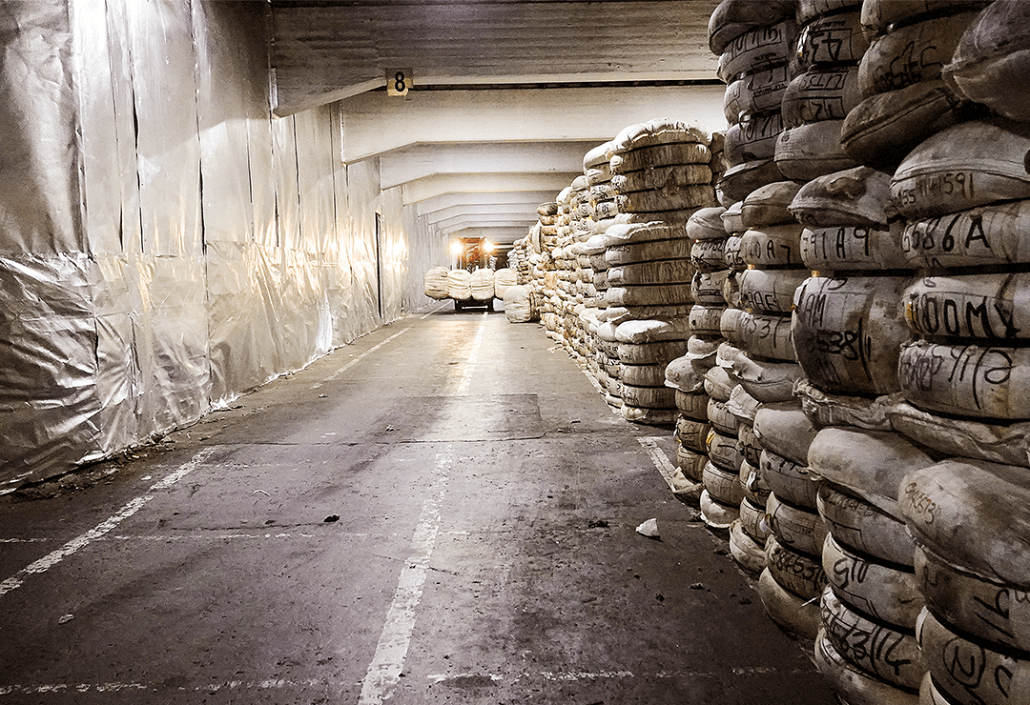
Creating a regenerative and sustainable business footprint started with several action steps. BKB’s Head Office in Gqeberha, Eastern Cape, fills an entire industrial street block. The 55 000m2 under-roofed administrative operations and wool store is where the organisation’s environmentally sound sensibilities are most visible. Phillip Fourie, at the time BKB’s Coordinator for Safety, Health, Environment and Quality (SHEQ) explains how their ‘cycle of continuous improvement’ has assisted the business to stay focused. The target was to set attainable goals in alignment with the 17 International Sustainable Development Goals (SDGs) as adopted by world leaders at the September 2015 United Nations summit. On the 1st of January 2016, the goals for the 2030 agenda officially came into force. By that time BKB was already doing business with a greater purpose in mind, measuring their environmental impact.
The 6th SDG calls for “availability and sustainable management of water and sanitation for all” and remains one of the most relevant development areas for BKB. In Gqeberha, the company is acutely aware of the value of water as this resource is particularly scarce here. The city’s infrastructure struggles to keep up with the sprawling urban development and the people who live here have had issues with water for nearly 20 years.
Amid another dry season and the city staring down the barrel of a looming "day zero”, BKB started to harvest rainwater. Phillip Fourie mentions that the 55 000m2 roof surface of the BKB Head Office, more than five hectares, presented an ideal opportunity to retain this resource. BKB invested in the installation of 100 000 litre tanks which brings the wool store and administrative operations a step closer to being self-reliant, should long spells of 'water shedding' take place. A three-stage reverse osmosis system, which includes three filtrations, delivers clean water. “A light shower fills up the 100 000 litre tanks quite quickly,” Fourie says. Keeping an eye on the weather forecasts, the water is used in time to make way for the next upcoming shower. “We have the capacity to harvest this precious resource, so it is our responsibility to do it,” Fourie says. The harvested rainwater can keep the wool store and administrative operations running for up to seven days, at an estimated usage of 21 000 litres per day. Providing for its own needs, BKB is easing the load on municipal resources. This has a direct and positive effect on water availability for local households in the area during these times of scarcity.
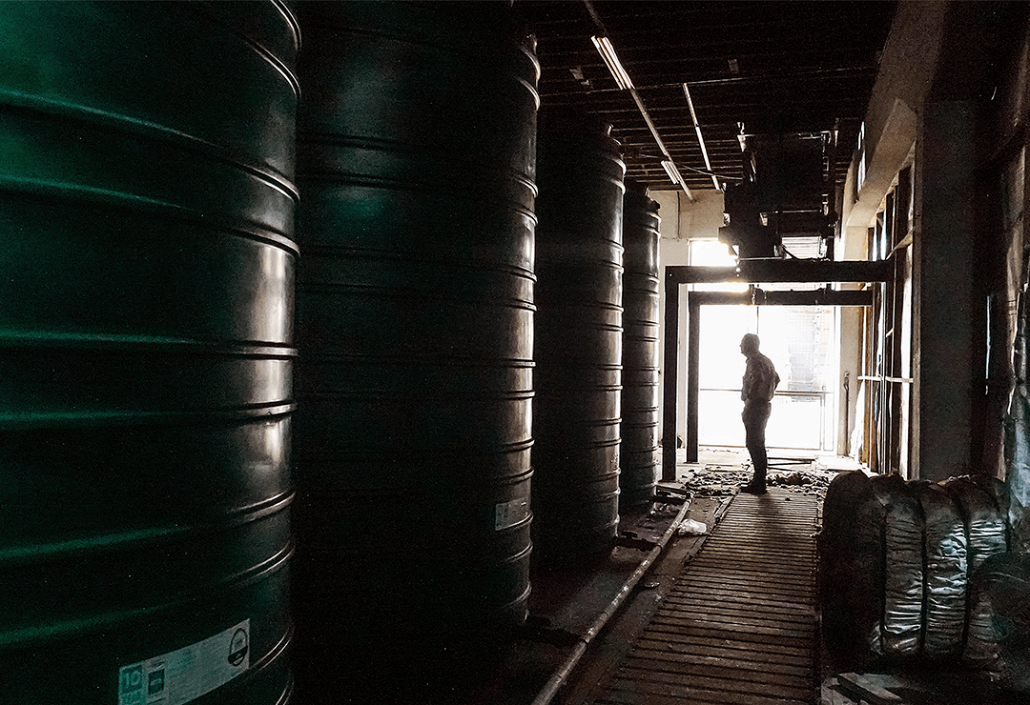
Water stewardship is one of BKB’s company’s key performance indicators (KPIs). Monitoring is integral in the company’s environmental, social, and corporate governance strategy (ESG). “If you want to know where the business is at, measurement is crucial” Fourie states. “The data helps to drive ESG, it enables shifts in the business that will result in sustainable impact.” Close monitoring of the entire water system enables BKB to manage every drop. According to this data, water use has dropped by 25% in the past two years since the rain harvesting started. In 2017, water meters were installed around the BKB pipeline, which generates a meter reading report at 30-minute intervals. Neura SA's Energy Management Division is tasked with collecting the BKB KPI-data. According to Dawie Fourie, Managing Director of the Energy Management Division, the system generates an over-usage spike report, which in turn alerts BKB to investigate. “This is usually a valve or something small that can easily be replaced,” Dawie Fourie says. According to Dawie, metering like this is the only way to significantly improve water usage. Real-time data collection has the added benefit of instantly alerting management to any leaks or pipe bursts along the pipeline, “and that is where our biggest saving has been," Phillip Fourie says.
The 7th SDG addresses “access to affordable, reliable, sustainable and modern energy for all,” and promotes the use of renewable energy. In 2013 an impressive photovoltaic installation (at the time, the biggest of its kind in the industrial area of Gqeberha) was installed on 7 000m2 of the building's roof space. BKB generates 760kVA of electricity and has a 160kVA storage capacity. Being grid-independent, the business continues to receive electricity from ESKOM and can still operate in times of weaker solar power generation. The possibility of feeding power back into the national grid, especially over weekends when demand from the wool store is low, is currently being investigated. BKB recognizes this as a chance to reduce the strain on the city's power grid, ultimately advantageous for the residents of Gqeberha. By reducing electricity and water demand, BKB helps alleviate pressure on the city’s infrastructure. As they continue to look for ways to support the greater metropolitan area, BKB lives up to the 11th SDG, which aims at creating resilient and sustainable cities and communities.
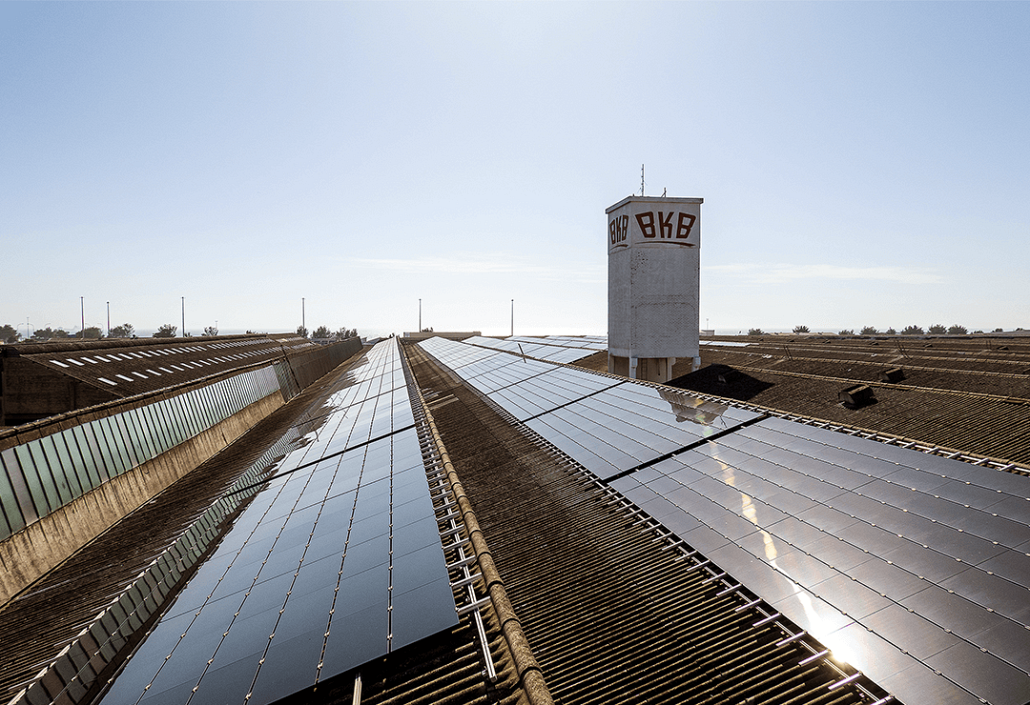
Phillip Fourie states that the solar energy system will soon be expanded to 1 megawatt capacity. This would enable the business to run entirely on solar-generated power, independent of the national electricity supplier. Fourie has witnessed rapid development in solar generation since the initial installation of the panels ten years ago, "the photovoltaic panels that we installed generate 110volts, whereas modern panels may deliver up to 720volts.” Innovation in the field of generation and storage makes the expansion to 1MW cost-effective as well as good business sense. Fourie acknowledges the huge saving that the switch to solar power has brought about in electricity bills but says that the strongest reward is in lowering BKB’s carbon footprint.
BKB is proud of the ISO accreditation, particularly ISO 14001, given to the Fibre Division, which aligns with the International Organisation for Standardisation (ISO) guidelines for environmental management. The ISO 14001 guidelines assist organisations in developing an Environmental Management System (EMS).
BKB started data collecting and monitoring of its energy consumption in 2013 as part of a cycle of continuous improvement. ISO 14001 Clause 9 deals with performance evaluation. “Measuring and evaluating our energy consumption is central to achieving and sustaining accreditation. “We continuously consider where and how savings can be made and where we can improve.” To reduce electricity consumption, the organisation installed LEDs in its 5-hectare wool store. Diode light is more energy efficient than traditional filament light. Motion sensors furthermore reduce energy consumption by only lighting up when activity is detected, “that has made a huge difference.” Phillip Fourie says that as an organisation, BKB actively participates in the ongoing journey of sustainable regenerative operations and is always on the lookout for new developments and opportunities for change, “Continuous enhancement of our business goals drives these innovations."
BKB employees are also encouraged to implement energy-saving protocols at home through active companywide communication. BKB’s communication team distributes a monthly environmentally friendly information email to further encourage the responsible use of available resources and lowering human impact on the environment. BKB has established a positive attitude among all its stakeholders towards sustainable and responsible business.
ISO 14001 emphasises that fuel consumption directly relates to the growing demand for fossil fuel, thus adding to the imminent depletion of this non-renewable natural resource. BKB is monitoring its fuel consumption closely and this forms part of their KPIs. More efficient routing of vehicles and a focus on driving etiquette has had a noticeable and positive impact. Good housekeeping and maintenance of the vehicles further lessens the company’s fuel consumption. BKB has started to employ battery-operated forklifts in the wool store and central distribution centres. Although not as powerful as their fuel operated counterparts, two electric forklifts are used at the Retail Central Distribution Hub in Uitenhage, while another is pulling its weight in the House of Fibre warehouse in Gqeberha.
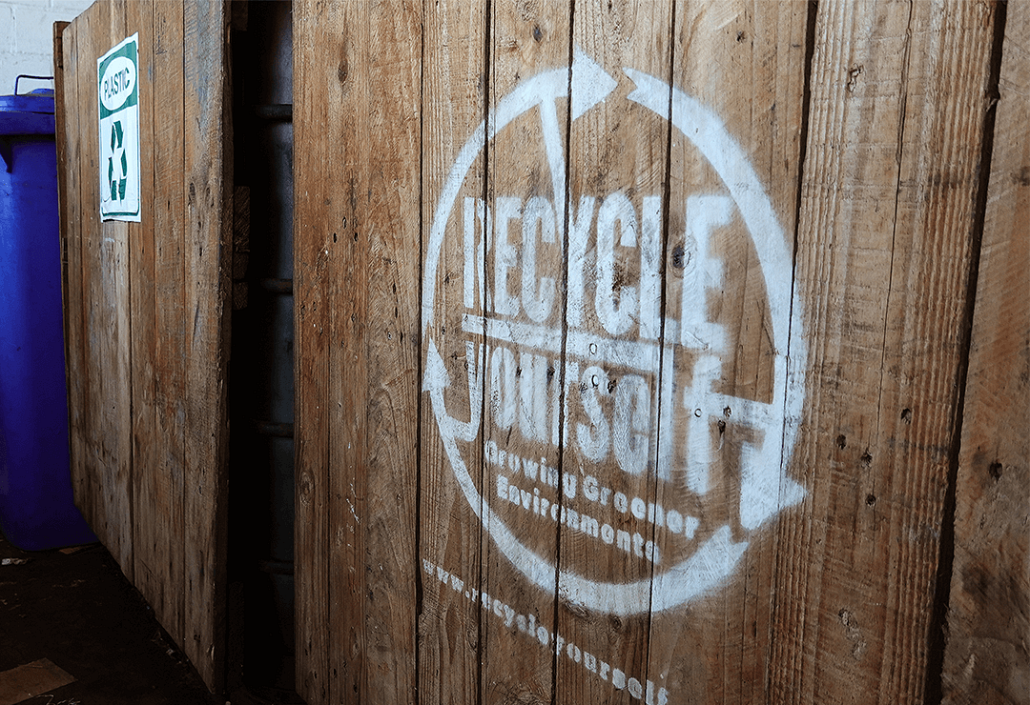
With the assistance of a waste management company, BKB has taken control of its waste stream. “We can recycle a reasonable amount of material every month,” Phillip Fourie says. Along with the ESG KPIs, the recycling streams and trends are monitored closely. BKB takes its role as a leader in the business community seriously and leads by example. Jobs are created with the recycling enterprise, as Phillip says, BKB strives to “be a responsible, environmentally friendly employer.” Most of the ‘waste’ generated by BKB is hydraulic oil, which is removed from the premises by a dedicated service provider. Old electronic equipment that becomes defective or redundant is dealt with in a recycling process run by the BKB IT Department.
The risk of polymer contamination in cases where plastic polymer bags are used to transport wool, remains a concern to BKB's Fibre Division. Curbing this kind of pollution is a continuous focus for everyone involved in wool processing. In a concerted effort to limit the use of degrading polypropylene (often used in agriculture), BKB ensures that multi-use bags made of 'Nylon 6' are widely available to their producers. Nylon 6 is a strong, durable, and highly engineered non-biodegradable fibre known for its remarkable elasticity. Nylon 6 bags are designed to be used and reused for as long as possible. To further curb contamination, the wool delivered in polymer plastic bags is handled in a separate area of the wool store. In this way, BKB is attending to the 12th SDG, which addresses the “environmentally sound management of chemicals and all wastes throughout their life cycle”.
Currently, the BKB Fibre Division is ISO 9001 accredited, which pertains to the quality of its product, as well as ISO 14001. The latter specifies the requirements for an environmental management system which enhances the organisation's environmental performance. The company has its eye set on the ISO 45001 certificate, an international standard for occupational health and safety. It is seen as a tool to protect employees and visitors from work-related accidents and diseases. Phillip Fourie believes that the Fibre Division will attain this accreditation within the next year.
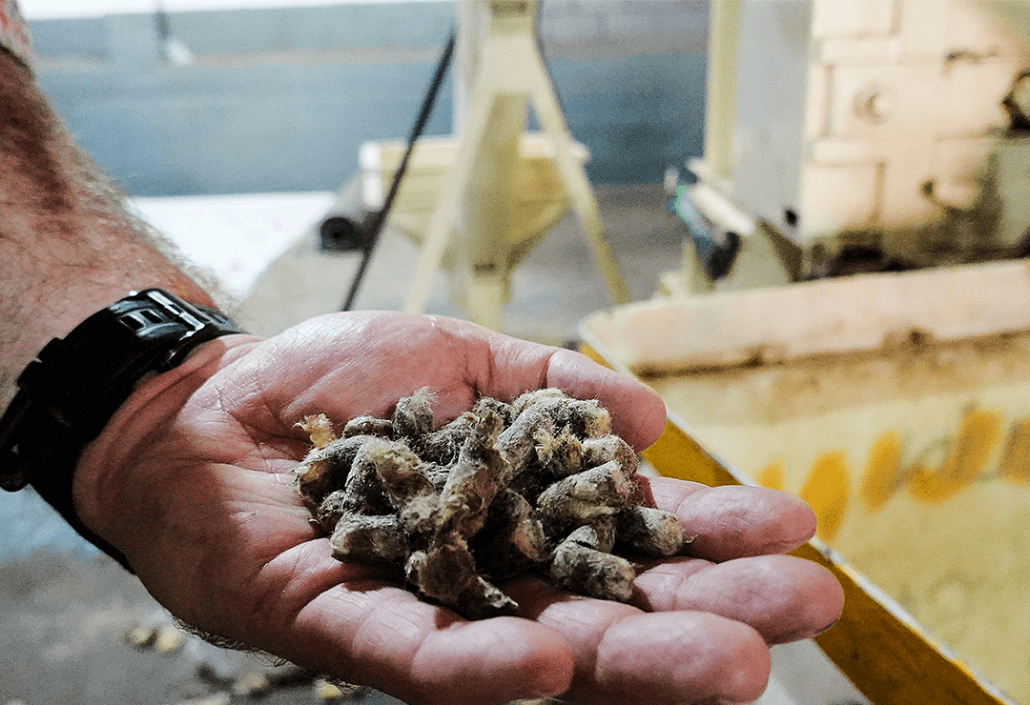
BKB is exploring a fertilizer manufacturing option for sub-standard wool pieces that are classified as unusable. Currently, this wool is pelletised and tested for its ability to break down and return valuable carbon into the soil. Wool naturally starts to degrade when it gets wet, and although such a wool-based fertiliser will have a slower release, Phillip Fourie believes that there is merit in this idea as part of regenerative farming. “As a farmer, you need the biosphere to develop a bigger variety of organisms, to improve your soil over time.”
As Dawie Fourie says, most industries are based in Gqeberha, for the convenient access to the local harbour and thus the export market. Companies hoping to engage on the global stage are required to take their performance, end-to-end, seriously. This involves the entire supply chain process, from product design and procurement of raw materials to delivery of the final product. In the early days of retail, the steps in this process were siloed, each handled separately with little sense of how one related to the other.
Those companies who employ traceable end to end practices, become the frontrunners. But, as Phillip Fourie says, rules and laws oblige companies, but a self-induced locus of control to operate responsibly is a much stronger motivation. "The closer a company operates to governance, the easier it becomes to operate in a cycle of continuous improvement. If you believe in industry standards like the Responsible Wool Standards and Responsible Mohair Standards, you will be able to contribute to lasting, sustainable and regenerative business. And to influence, information is the key.”
The statistical data presented in this story is relative to May, 2023.